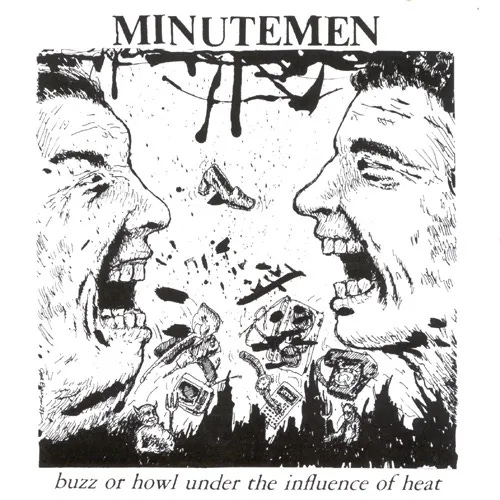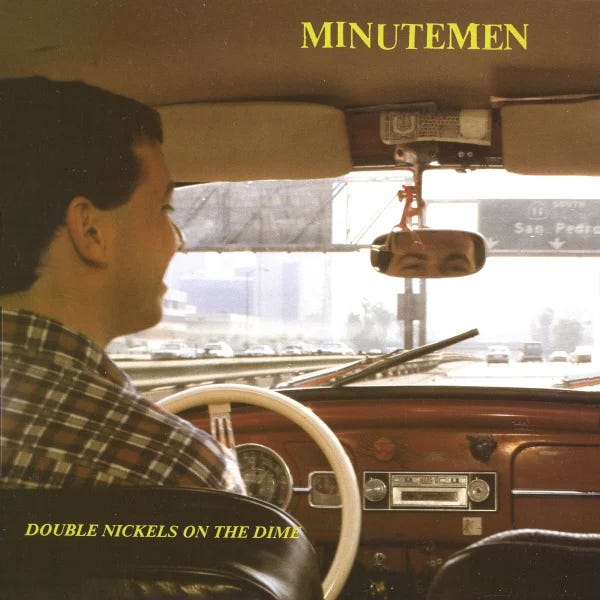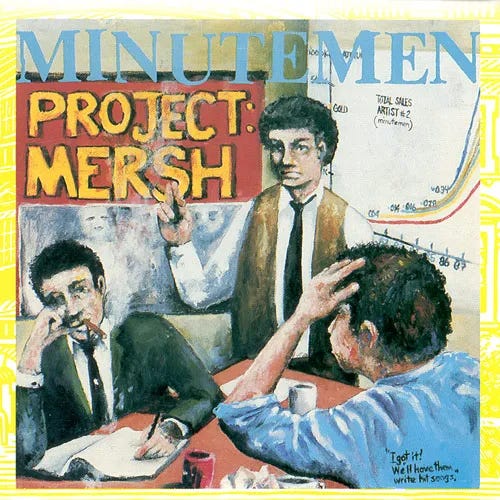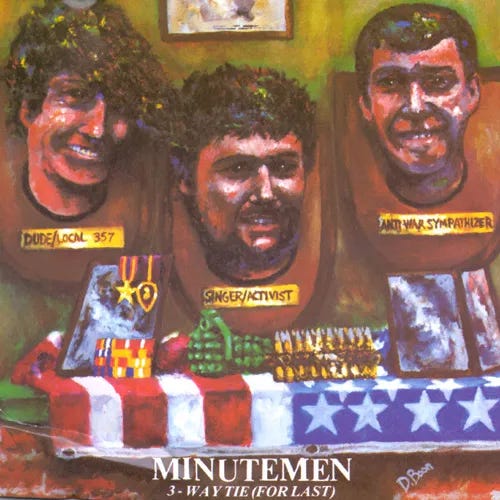Minutemen
A richer understanding of what's already understood
In the final days of December 1985, D. Boon, red with fever, lay down in the backseat of his girlfriend’s van, and when the van flipped and crashed, D. Boon was killed instantly. His death at the young age of 27 effectively ended the chapter in the book of hardcore titled ‘post-hardcore’ which was more or less co-written completely by Minutemen and Hüsker Dü and no one else. Minutemen instantly disbanded; Dü signed onto a major label and promptly disbanded thereafter.
It’s hard to talk about either band without mentioning the other because they were similar in some regards and so dichotomous in all other aspects. Superficially: both D. Boon and Bob Mould loved overloading the treble on the guitar too, and both put out double albums in the same year that are the respective artists’ best albums. But more broadly, both formed around the same time as part of the hardcore scene and both ‘grew up’ quickly, exemplified by the very gradual slowing down of tempo and letting songs breathe and also by both bands’ embrace of classic rock that their contemporary bands had thoroughly rejected: Dü covered Donovan on their debut album that probably seemed like a piss take at the time but clearly wasn’t, while Minutemen would cover Creedence Clearwater Revival and Steely Dan on Double Nickels on the Dime; D. Boon’s name was selected for a few different reasons, but most of all because of the resemblance to Blue Öyster Cult’s E. Bloom.
I rank Double Nickels over anything that Dü did, but Dü had the better discography, no debate. In part because they were a band for longer which let them put out more albums, sure, but mostly because it’s interesting to watch a band evolve at the clip that they did. Though their last two albums don’t particularly interest me, how they got there does. In the six years that they were active, Minutemen barely changed, although 3-Way Tie (For Last) glimpses what might have happened if they signed onto a major label themselves (i.e. the same thing that happened to Dü). This is perhaps no better exemplified by comparing Double Nickels on the Dime with Zen Arcade. Minutemen’s big double album statement was not at all ambitious like Dü’s prog storytelling in hardcore setting, it’s just a fuckload lot of songs with no concept beyond some car noises.
Incredible songs, mind you. Minutemen was hardcore that liked a funk bass-line, jazz drumming and a jazz solo; there are D. Boon’s solos that play like a saxophone player that made the leap to electric guitar and basically played it the same way. That being said, don’t mistake them for an art band. They were the anti-art punk band. Wire, who had fully embraced being the band of art students that they were, notably disposed of the guitar solos for Pink Flag, an album that had a notable influence on Minutemen in terms of song structure and song length. By contrast, Minutemen kept the lengths the same, yet still made room for solos. Only if they heard mortar shells, maybe.
Between December 1980 through the following year, Minutemen released two EPs and then their debut album which all amounted to still less than 30 minutes of music. Of these, it’s the debut 7-song EP Paranoid Time that’s the best: not as few songs as the 3-song Joy which leaves you wanting more and not as many songs as The Punch Line debut album where it gets very hard to distinguish the songs beyond “Tension” (with its great, clean hook) when there’s that 18 of ‘em. Some of the songs have, jeez, harmonics (“Validation”, “Paranoid Chant”) that make them feel more ‘song-y,’ and the latter manages to be both humourous and concerning (“I don't even worry about crime any more […] I keep thinking of RUSSIA! OF RUSSIA!”). The politics musings throughout are far more generic than what they’d soon be (“I never noticed that fascism has many disguises”); “Definitions” call to tear up your dictionaries feels like a similar sentiment to “Do You Want New Wave or Do You Want the Truth?” but not well-articulated. They do trump early Dü in terms of song quality at least.
5 short songs that scraps just over 6 minutes released with the note ‘WE NEED MONEY’ underneath the penis-etched vinyl, you’d have no idea that Bean Spill EP is secretly their best EP: the only song that I’m not totally convinced by is “Afternoon,” because I’m pretty sure the song is about peeing on concertgoers (first line: “Well, I have too pee”; last lines: “Some examples of winners and losers”) but they don’t connect. The other four songs are great. “Futurism Restated” somehow manages four different grooves in under a minute including a climax (“The wheel is an extension of the foot…TAKE OFF!”). “Bean Spill” is what happens when you take a James Chance bass-line and merge it with Arto Lindsay’s psycho guitar experiments as DNA. “If Reagan Played Disco” casually equates Ronald Reagan to the Nazis and then puts down why Reagan would have been a poor disco artist: “He'd sing lame lyrics / And try to reach the working man.” Hurley has never sounded more booming than he does on “Case Closed.”
18 songs, almost all of them great. It’s their second-best album by default and stopping it from being their best album is that, simply, there are only (‘only’) 18 songs. Given that there isn’t a song as great or even as song-y as many of the ones soon to come, you might think that you won’t remember these as they blaze past but I think of many of them very fondly: “Pure Joy” and “Sell or Be Sold” are unbelievably funky. Hurley’s drum solo on “East Wind/Faith” is pure turbulent sky while Mike Watt’s bass-line on “Split Red” is pure 50s’ bop; in a way, these two short songs announce their intention as a jazz fusion band where the ‘fusion’ part happens to be hardcore. It’s actually the album’s longest song that’s the one that I skip the most: “The Anchor,” whose chicken-scratch guitar doesn’t get them far enough for 2 and a half minutes. Best moment: Hurley transitioning “Beacon Sighted Through Fog” to its climax by switching to what sounds like a kit full of trash cans. Second-best moment: “BOB! DYLAN! WROTEPROPAGANDASONGS!”
I think Minutemen wins the double album competition of ‘84, but Dü easily won it for ‘best EP of ‘83.’ Metal Circus comes very close to being Dü’s best release because there’s no room for filler; by contrast, Minutemen make room for filler in its 15 and a half minutes for a free jazz instrumental with a great name and then a 40-second song to joke about toes. Put another way, “Cut” is the best song, with a guitar riff with absolutely zero space that forces you to brace yourself for the possibility that this ice machine might actually cut you. And yet, there is no comparison between “Cut” and Metal Circus’s best song, “Diane,” which was a harrowing song that Minutemen never attempted, let alone could ever pull off, I suspect. Ultimately, a limitation for the band was that you can’t get atmospheric or truly despairing on songs this short. You can get groovy, at least, which is what the other songs do, particularly “I Felt Like a Gringo,” while “Little Man with a Gun in His Hand” slows it down just enough that the song breaches 3 minutes and sounds like Mission of Burma.
Not an album. A compilation made out of unreleased tracks and live songs. The recording of the live songs in the second half sounds like they were captured on someone’s recorder who kept it in their pocket when they stepped outside the house for a cigarette. Not worth anyone’s time, is what I mean. But if you took the best songs from the first half, you’d have a great EP so it’s damn shame they’re ‘buried’ so to speak: “Working Men Are Pissed” (damn straight!), “I Shook Hands” (a very tightly performed instrumental), “Below the Belt” (incredible bass and drum workout) and “Tune for Wind God” (another instrumental, but I get so much joy out of hearing them yell ‘FOR THE WIND GOD’ right before Hurley commences his barreling down as if he were the wind).
Contrary to most popular double albums, the appeal of Double Nickels on the Dime is not that they cover a wide range of genres: an acoustic instrumental is as ‘diverse’ as this album gets. The appeal of Double Nickels is that there are 45 (43 on my CD version) of basically the same song over and over, a song that feels like the greatest thing in the world while it’s happening. About every other song lays reasonable claim for having the best bass-line, drum part, guitar riff or guitar solo. Sometimes multiple.
Side D. - The best side. “Anxious Mo-Fo” has that left-right-left-right chuggin’ hook. “Theatre is the Life of You” starts with an intro that’s pure humid summer air. “Viet Nam” plays like a suped-up Commodores song the moment Mike Watt puts an end to the barraging intro with a single note and starts the groove. “Cohesion” is absolutely indispensable, resetting the album while also looking ahead to the slower “Do You Want New Wave or Do You Want the Truth?” in terms of tempo. “It’s Expected I’m Gone” has a solo that hits a high note that sounds like a mistake but also like the occasional sharp, high unexpected blats Sonny Rollins did on occasion, and I appreciate Watts adding a little bit of bass buzz during it. “#1 Hit Song” comes in like Jimi Hendrix’s “Cross-Town Traffic” a.k.a. a train. “Two Beads at the End” invents anthemic indie rock in the last 40 seconds as it crashes over and over against the shore. “Do You Want New Wave…” has a neat effect in the back-and-forth bassline and vocals that makes it feel like a psychedelic wash. D. Boon shoves as many words as he can into the first half of “Shit From an Old Notebook” so that he can let his guitar do the talking in the second half in what is my favourite solo on the album. Hurley’s drums add so much lyricism to the already-great riff on “Nature Without Man.” “One Reporter’s Opinion” is a funny little song about Mike Watts (“What can be romantic to Mike Watts?”) that ends the first side with the craziest of things: a held vocal note. Of the first side’s twelve songs, the only song that I have rated 3 stars on my Itunes is the live cover of CCR’s “Don’t Look Now” and even that one has a nice intro.
Side Mike - “A richer understanding of what's already understood” is what happens to me every time I visit this album, finding something new to love each time. At the same time, “I’m fucking overwhelmed!” also applies. The second side has the same ratio as the first side, and the only song that I don’t care for is “Retreat,” whose soft parts have a nice groove to them but whose loud parts are nothing interesting. “The Big Foist” and “My Heart and the Real World” are both surprisingly upbeat on an album as often pessimistic as this one; “Maybe partying will help,” but I doubt they believe it. “Take 5, D.” plays a similar role to “Cohesion,” which is a weird little detour when the album needs it even if the lyrics are about a literal bathroom from their landlord. “Maybe Partying Will Help” plays the same way as “Viet Nam” (i.e. incredibly); the opening 30 seconds or so as “Corona” are what it feels like to put the lime in the bottle and then drink some on a blistering hot day. The bass-line of “Toadies” stopping completely for the first delivery of the title word and then burping once to harmonize with the second, repeated instance and then starting the groove again is just too good. There’s a drunken sadness in the way the backing vocals (already a crazy development) come in on “God Bows to Math” (one of their best titles) that reminds me of the Beatles’ cover of “Anna.” And of course, the second side will forever be fondly remembered because it opens with what might be their best rocker and then closes with what is definitely their most touching song. There has been no more vital set of five words, certainly not in underground/indie culture, than “Our band could be your life”, and then the band proceed to align themselves to Bob Dylan via ‘scientist rock’: Television, the Clash and X while the C & G chords recall the quieter side of the Velvet Underground.
Side George - Three songs that I don’t rank that highly now as opposed to the first two sides’ one cut apiece: “You Need the Glory” should have been a little shorter; “The Roar of the Masses Could be Farts” is a song whose title I can recall far easier than the actual song; “Please Don’t Be Gentle With Me” has a good bass-line underneath the empty bluster. No song as good as the best songs from any of the other sides either: “This Ain’t No Picnic” is great, but it ain’t no “Viet Nam,” “History Lesson” or “Jesus and Tequila.” D. Boon rips “West Germany”’s riff to shreds; Hurley does the same on “The Politics of Time”; D. Boon smoothly transitions from solo to groove on “Nothing Indeed.” The political smarts aren’t just that they see the problem (“I got my bills and the rent / I should pitch a tent / But our land isn't free”), but the chilling self-reflection (“The media robs and betrays us / No more lies / We are responsible”; “There is no cause / No cause at all / For my hesitation / Nothing indeed”).
Side Chaff - Four songs now that I have at 3 stars on my Itunes, so this is the worst side, for sure, but it’s still better than what the band dubbed it would suggest. For starters, ‘Side Chaff’ kicks the final side of Led Zeppelin’s Physical Graffiti’s ass, which was actual chaff by comparison. I mean, the reject pile has one of the album’s five best songs on the whole album in “Jesus and Tequila,” just how chaffy could it be? “Untitled Song for Latin America” is another good groove (although Hurley’s drums sound far away when the groove breaks up); “The World According to Nouns” is a surprisingly brooding atmospheric cut with a great title; “Love Dance” is the upbeat instrumental that the Pixies would have made if they went to the beach instead of to the sex dungeon. “Martin’s Story” is obvious filler (with a momentum that makes me wonder if they heard Yes’ “Siberian Khatru”) but I promise you that their cover of Steely Dan’s “Dr. Wu” is not. So cute, those harmonies, in their completely unrehearsed glory that somehow makes the song’s mysterious pre-hook (“Katy lies, you can see it in her eyes”) feel more poignant than the words already were.
For those keeping track, that’s 9/43 songs on my Itunes that I have at 3 stars, and none below that. A pretty good rate, I say! Call me when Spotify lets you do something like this. Actually, don’t: I could care less.
A 6-song EP that was supposed to be an ironic take (“I got it! We’ll have them write hit songs,” the cover says, depicting label types thinking about how to get Minutemen to sell) but the following 3-Way Tie (For Last) suggests it wasn’t all irony. Weakest Velvet Underground album or not, I’m a big fan of Loaded which actually expanded the band’s vocabulary; Project: Mersh doesn’t do that beyond folding in some peppy horns from associate Crane. They slow down the songs and create a little too much ‘dead air,’ while the fast-slow-fast-slow approach of “Hey Lawdy Mama” and “Tour-Spiel” both seem grafted together from separate songs (the latter’s choruses seem lifted from the Who’s Tommy).
Two chief issues here, the same as Hüsker Dü’s late-period albums: (1) the drums aren’t hitting with the same impact, which is death to a band whose drummer was so vital; the first measure of “Courage” is kinda depressing to listen to, which is a shame because Boon sings it so passionately, and (2) like every good citizen, I like the Meat Puppets too, but ultimately the Meat Puppets’ influence on this album—Minutemen cover the Meat Puppets and also thank them for “obvious inspiration”—was detrimental to the band because it softened them up a little too much. Whereas only one song from Double Nickels on the Dime breached the 3-minute mark (“Mr. Robot’s Holy Orders,” omitted from my CD release anyway), there are four songs that do so, including a Blue Öyster Cult cover that lasts 4 minutes so that it could make room for an overdubbed bass solo from Mike Watt so it feels like he’s playing against someone else. “Political Nightmare” (which even adds in some fuckin’ echo) has some powerful words (“Did anyone gain? / How much did it cost?”) but I can’t help but shake the feeling that the same band from just a year prior would have tightened it into a far more visceral 1:50 song.
3-Way Tie (For Last) contained a mail-in ballot for fans to vote which live songs Minutemen would play for the aptly-titled Ballot Result, and I am overjoyed that someone threw in the 30-second cover of the Urinals’ “Ack Ack Ack” among expected staples (i.e. “History Lesson - Pt. II” and what I dub the Holy Trinity of Minutemen ‘[Person] [Does] [Thing]’ Songs: “If Reagan Played Disco,” “Bob Dylan Wrote Propaganda Songs” and “Political Song for Michael Jackson to Sing”). The recording quality starts off pretty strong and then gets unexpectedly awful near the end.
After D. Boon’s death, Hurley and Watt considered hanging up the music cape when a 22-year old Minutemen fanatic named Ed Crawford made the insane journey from Ohio to California to convince them otherwise. That’s the story of how fIREHOSE came to be, but I don’t believe for a second that either Hurley and Watt would have stopped making music altogether - when you’re among the world’s best bassists and drummers, you don’t simply stop. And so there were many, many side projects, supergroups, husband-wife bass jam duos and solo albums.
As for fIREHOSE, Crawford can hit notes better than D. Boon could to which I say big fucking deal: as a vocalist, he was as generic as they come. Guitar-wise, no comparison. There’s a lot of emphasis that there’s gonna be a guitar solo on “Honey, Please” from second album If’n, and when Crawford finally enters, it’s doesn’t sound like it’s in the right key and then resorts to jangle pop chords that you can get elsewhere (it sounds very much like the contemporaneous the Go-Betweens’ “Spring Rain”). That said, his skill improves when fIREHOSE made the leap from SST to Columbia for their fourth album, a leap that Minutemen never got a chance to and I predict wouldn’t have worked out for them anyway: “Epoxy for Example” has a guitar solo whose tone makes me think of, um, spring rain to be honest, and “Song for Dave Alvin” is a song written around a razor guitar riff. But at what cost! The appeal of the first three fIREHOSE albums is that we’re still in the presence of a tremendous rhythm section, and the polished production of Flyin’ the Flannel sands away at Hurley and Watt’s edge. On If’n and Fromohio, Watts leads the charge on many of the songs and Hurley gets a chance to showcase some of the old magic and even gets the occasional drum solo song (“Let the Drummer Have Some” and “‘nuf That Shit, George”). Final album Mr. Machinery Operator, produced by Dinosaur Jr.’s J Mascis, goes in the opposite direction of Flyin' the Flannel: too muddy.
Hopefully any of the loyal Minuteman fans listened to If’n’s “In Memory of Elizabeth Cotton” and backtracked to Elizabeth Cotten’s Folksongs and Instrumentals With Guitar so they could hear the masterful “Freight Train” (brief as her recording career was, Cotton = the female John Hurt and female John Fahey). And Watt’s tribute to R.E.M. from that same album is actually pretty faithful to the band that had once taken Minutemen on tour. (In Michael Azerrad’s Our Band Could Be Your Life, there was the humourous bit about Michael Stipe interviewing Minutemen and none of the members of the band having any idea who Stipe was at the time beyond “some long-haired guy.”) Ultimately, fIREHOSE answered a question I never really cared enough to know: ‘what if Minutemen wrote songs with verses and choruses?’












